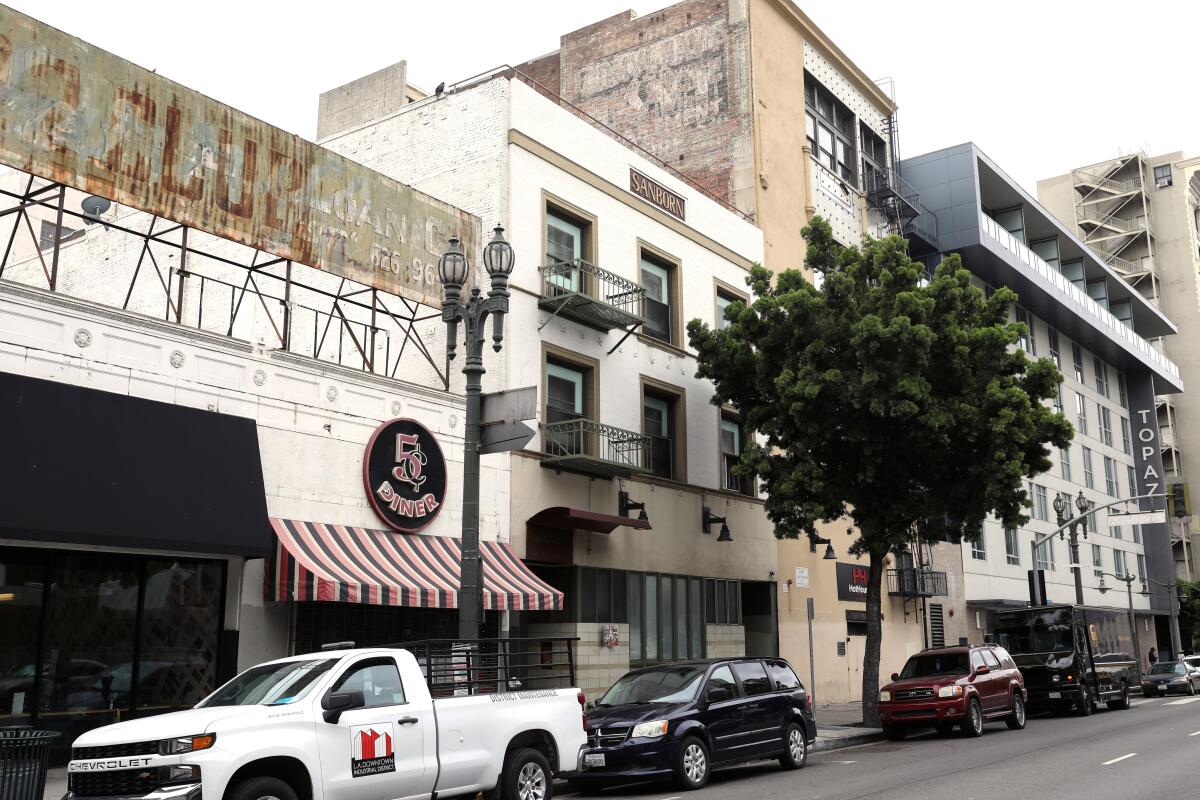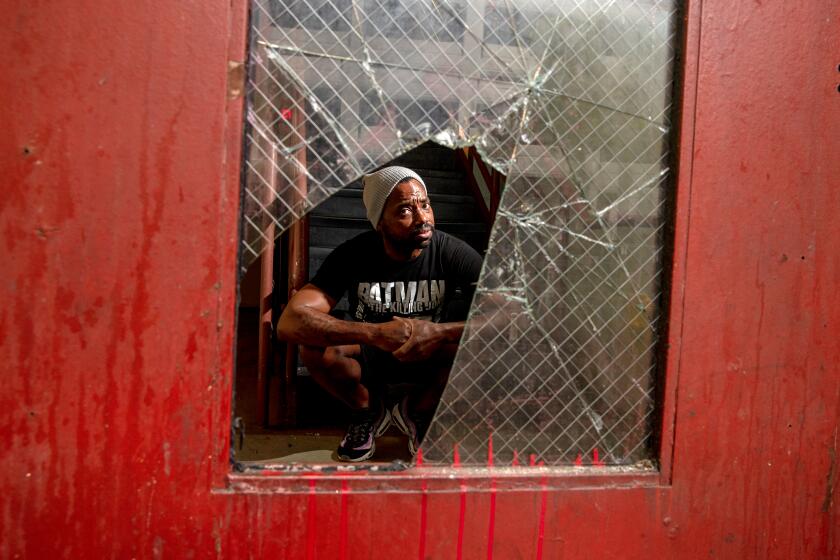Los Angeles city officials consider ousting Skid Row Housing Trust receiver

- Share via
Los Angeles city officials are recommending the removal of a receiver brought on to rehabilitate 29 distressed buildings operated by the defunct Skid Row Housing Trust and oversee the welfare of about 1,500 low-income tenants.
With the receivership facing a financial meltdown, the Los Angeles Housing Department also recommended that the City Council authorize a $10-million loan to maintain and repair the buildings and pay receivership costs for several more months.
Recapping a litany of disputes with receiver Mark Adams over his alleged lack of progress and inability to obtain credit at reasonable rates, Housing Department general manager Ann Sewill said the loan should be conditioned on Adams’ removal.
“The city has been considering alternatives available to resolve what has become an unfortunately disappointing performance by the current receiver,” Sewill wrote.
The recommendation is scheduled to be heard by the City Council Budget and Finance Committee on Monday and could go before the full council as early as Tuesday. A spokesman for City Atty. Hydee Feldstein Soto, who selected Adams for the receivership, said she concurs with the recommendations.
The city, however, cannot independently replace Adams, who was appointed by a Los Angeles Superior Court judge at the city’s request. Instead, it would have to petition Judge Mitchell Beckloff to discharge Adams and appoint a new receiver. Beckloff gave Adams a strong endorsement during the most recent hearing on the case.
“I appointed you because I think you’re the person for this job,” he said during the June 15 hearing. “I still think you’re the person for the job.”
In the report released Friday, Sewill also offered a sober assessment of the difficult path ahead. She wrote that some of the buildings may be “damaged beyond repair” and should be demolished and that the costs to make repairs and support underwater properties for an unknown time will likely go well beyond the $10 million.
Conditions in the buildings have deteriorated in recent years as cash flow problems led the nonprofit trust to fall behind on maintenance and slash staffing and security. Nearly 800 of the trust’s 2,000 units have been cut off from rent subsidies because of uninhabitable conditions. Residents complain of filth, clogged plumbing, pest infestations and constant intrusions by street people who use drugs, set off fire alarms and sleep in hallways.
“We know that to attract responsible experienced supportive housing owners, the city and other government partners will need to increase loan amounts to pay for repairs, replenish reserves, and [pay off] all receivership notes,” Sewill wrote.
Those costs could partly be paid by the limited partners who own some of the buildings with the housing trust. But the nonprofit, which collapsed financially earlier this year, is the sole owner of 12 of the buildings. That would leave the city likely paying any costs, possibly with help from state housing construction programs.
The Skid Row Housing Trust was a model for nonprofits housing homeless people in Los Angeles. Behind the scenes, it was imploding — leaving tenants in squalor.
The $10 million is necessary to ensure sufficient funding for at least four to five months, the report said. At that point, more than half the properties are expected to be removed from the receivership and taken over by other nonprofit general partners.
But the remaining buildings, generally the oldest and most costly to maintain, could have deficits of up to $700,000 monthly.
Beckloff has approved the release of six properties that will be taken over by PATH Ventures and one by LA Family Housing, both nonprofit agencies that provide homeless services and develop and operate housing. Another seven are on track to be released by late fall once permanent financing can be obtained to replace construction loans that were used to build or rehab them.
Those buildings, however, are the most financially viable in the portfolio. They have been built or remodeled in recent years and still have limited partner investors who will bear some of the costs.
Dissatisfaction with Adams had been building since his preliminary appointment in April. City officials, including Mayor Karen Bass, roundly criticized him early this month after the property management firm he hired sent eviction notices to hundreds of tenants who were behind on rent. The terms of his appointment prohibited him from evicting any tenant for nonpayment. Adams said he did not authorize the eviction notices and sent letters retracting them.
The city’s confidence in Adams deteriorated further when it learned he had agreed to pay 15% interest on loans for costs that he estimated already included up to $1.7 million for security. The city contends that the terms of his appointment set a limit of 10% on any loans.
During the June 15 hearing, Deputy City Atty. Alia Haddad told Beckloff that the city was speaking with a possible replacement.
Sewill’s report elaborated on the city’s concerns.
Besides not being able to secure funding at a reasonable rate, she wrote, he “has not hired sufficient staff to secure and operate the properties and make the necessary repairs and, perhaps more importantly, has not provided the court-ordered reporting and accounting the city and other agencies require.”
Adams, she wrote, had made insufficient progress on “resolving serious code enforcement violations such as repairing the fire/life safety systems, fixing plumbing problems in common area restrooms and restoring units that have been cited for abatement ... for minor code violations.”
Adams told The Times that he would respond to the city’s report next week in court. He also cited Judge Beckloff’s support for him.
A Times review of Adams’ record, published last month shortly after his appointment, found that at some properties where Adams was the receiver, tenants faced the risk of eviction, owners lost their houses and multiple judges determined he inflated his fees by six-figure amounts. Additionally, in two cases comparable in size and scope to the Skid Row Housing Trust matter, Adams left years before they were resolved and, in court filings, omitted key facts about his involvement in them.
Feldstein Soto told The Times that she selected Adams based on a recommendation and did not conduct an extensive background check.
To replace Adams, the report said, the city has conducted an extensive search that identified Kevin Singer, the founder and president of Receiver Specialists, as the best candidate.
Singer, the report said, has worked 23 years as a receiver and previously owned a property management company that oversaw 75 buildings.
He received a strong endorsement from San Francisco’s mayor and city attorney for his performance as the receiver for 11 properties owned by a woman who became known as the city’s cruelest landlord.
“Mr. Singer and his staff have established a very methodical, straightforward, and realistic numbers-based approach to the receivership, and they have prepared and submitted a six-month look-ahead budget for the city’s consideration,” Sewill said.
More to Read
Sign up for Essential California
The most important California stories and recommendations in your inbox every morning.
You may occasionally receive promotional content from the Los Angeles Times.















